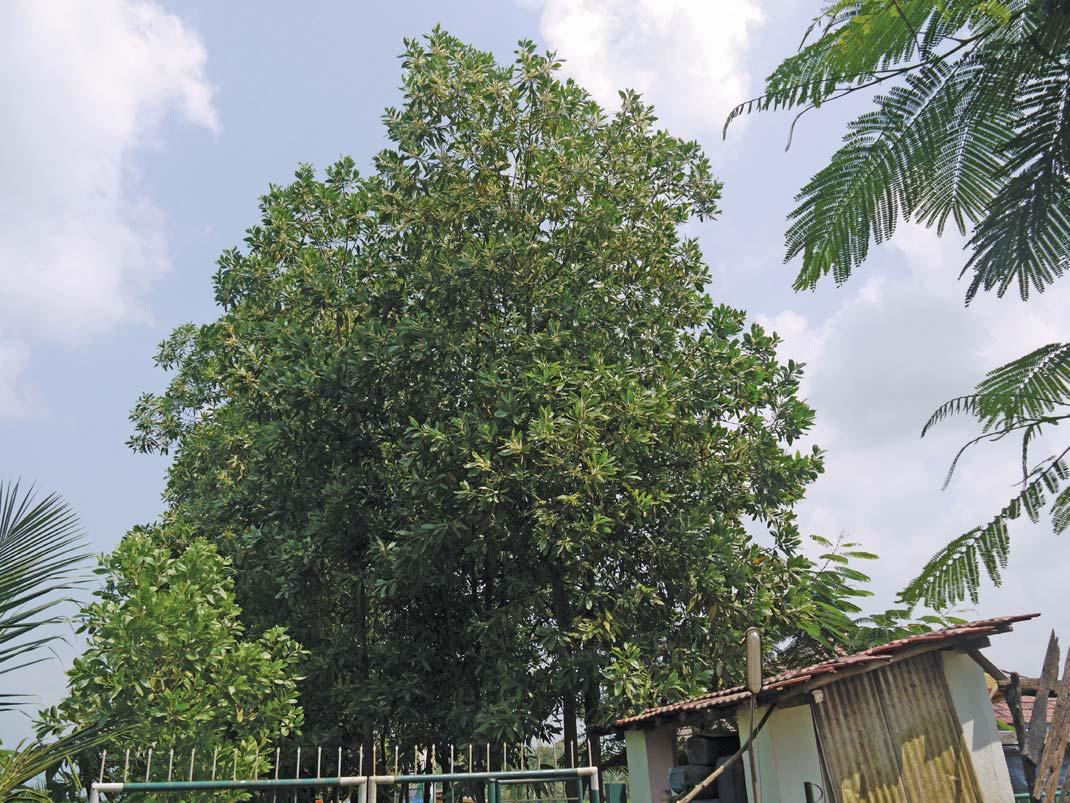
The hickory or screw-pod wattle (Acacia implexa) is an erect tree up to 15m tall. It has a single stem or is divided near ground level into two or three main stems. The leaves are dark green, narrowly elliptic and sickle-shaped, 7cm to 20cm long and 6mm to 25mm wide, and narrow at the base. The bark is rough and greyish.
The flowers are arranged in globular heads, are creamy to pale yellow, and flower from December to March.
The pods are narrow (4mm to 7mm wide), coiled, and twisted to a length of 25cm. The seeds are dark brown. Hickory wattle is native to Australia. According to the South African National Biodiversity Institute (SANBI), A. implexa has been recorded in the Western Cape at Tokai forest, Stellenbosch and Wolseley.
Environmental and economic impact
This fast-growing tree invades agricultural lands, planted forests and disturbed areas. It can become highly invasive if not controlled. It spreads through suckers (shoots that grow from the base or the roots of the tree).
The National Environmental Management Biodiversity Act of 2004 (NEMBA) classes the tree as a Category 1a invasive plant, an invasive species requiring compulsory control.
“Any specimens of Category 1a listed species need, by law, to be eradicated from the environment. No permits will be issued,” states SANBI.
Diese Geschichte stammt aus der Farmer's Weekly 12 May 2023-Ausgabe von Farmer's Weekly.
Starten Sie Ihre 7-tägige kostenlose Testversion von Magzter GOLD, um auf Tausende kuratierte Premium-Storys sowie über 8.000 Zeitschriften und Zeitungen zuzugreifen.
Bereits Abonnent ? Anmelden
Diese Geschichte stammt aus der Farmer's Weekly 12 May 2023-Ausgabe von Farmer's Weekly.
Starten Sie Ihre 7-tägige kostenlose Testversion von Magzter GOLD, um auf Tausende kuratierte Premium-Storys sowie über 8.000 Zeitschriften und Zeitungen zuzugreifen.
Bereits Abonnent? Anmelden

Syngenta Seedcare celebrates a decade of innovation
Syngenta's ambition is to enable their customers' investments to grow in healthy soil from treated seeds to young plants through innovation and collaboration, writes Magda du Toit.

Agri workers shine at Western Cape awards
Lindie-Alet van Staden, a garden and olive orchard manager at L’Ormarins Wine Estate in Franschhoek, was crowned as the Western Cape Prestige Agri-Worker of 2024 at a gala event recently held near Paarl.

Small and large farmers recognised at grain awards
The annual Grain SA/Syngenta awards ceremony bears testimony to the quality of farmers in the grain industry.

Growing partnerships: Fedgroup's flexible and innovative approach
Janine Ryan spoke to Warren Winchester, general manager of impact investing at Fedgroup, about why the company became involved in agriculture, and what it offers farmers and their immediate communities.

Why fish farms fail, and how to avoid becoming a statistic
The popularity of launching fish farms is not matched by their success. Leslie Ter Morshuizen, owner of Aquaculture Solutions, explores the factors that cause most of these businesses to go under.

Where history and modernity meet in a luxurious setting
Brian Berkman kept his eyes peeled for ghosts in the oldest continuously run hotel in South Africa, but all he found was a fabulous two-night stay.

THE HITCHING POST
I'm a stylish elderly lady with a radiant glow and a good sense of humour that keeps me young at heart.

Cutworms: check the weeds on your fields!
Zunel van Eeden explains why understanding the ecological interplay between cutworms and weeds is crucial for effective pest management. Producers should disrupt the life cycle of cutworms to minimise crop damage.

Does high-density grazing mimic grazing patterns of game?
In their paper on high-density grazing in Southern Africa, professors Angelinus Franke and Elmarie Kotzé from the Department of Soil, Crop and Climate Sciences at the University of the Free State say high-density grazing systems may not accurately reflect natural ecosystems. Roelof Bezuidenhout reports.

Global grain outlook: 2024/25 marketing season
In its latest summer crops report, the Crop Estimates Committee says South African farmers intend to plant 4,47 million hectares of summer grains and oilseeds in the 2024/25 season, up 1% from the previous season. As South Africa exports maize and soya bean, Annelie Coleman reports on the latest trends in the international grain and oilseed markets, amid fluctuations in weather conditions and ongoing armed conflicts.